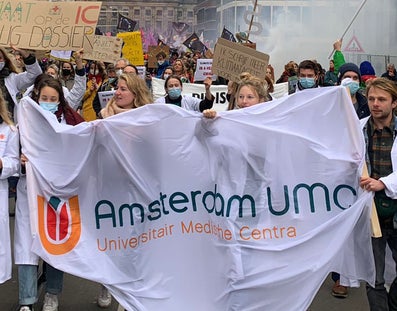People who are sick want to recover as soon as possible. People who are chronically ill want to cope and live as well as possible with their disease, disorder or impairment. But ideally, we all want to be and stay healthy. Under the motto ‘prevention is better’, Vrije Universiteit Amsterdam is committed to achieving this to the greatest extent possible. With education, research and together with partners.
Healthy living is not always easy. We sit for long periods and do very little exercise and sport. We experience stress more often and at a younger age, whether during our education or while working. We make unhealthy food choices, tempted by the wide range of products available in supermarkets. And drinking, smoking, doing drugs or taking pills has become a regular habit for an increasing number of people in our society.
At the same time, we are living longer and putting more strain on our planet. A growing number of people at an increasingly younger age are unable to actively participate in society due to various impairments or illnesses. Our demand for healthcare is increasing, while healthcare funding and the availability of staff are already major constraints. All of this affects the labour market, the economy and society as a whole.
With the steady increase in population, how can we distribute the limited healthcare resources as sustainably and equitably as possible? How can we support people in living healthy lives and help them optimise their own health and well-being? How can we make diagnoses as timely and accurate as possible so people can get better faster? How can we reduce health disparities between social groups? How can we strengthen self-reliance and help people take charge of their own health and (chronic) illness? And how can we ensure that healthcare is future-proof, accessible and of high quality? All of these questions are central to education and research in the profile theme Human Health and Life Sciences at VU Amsterdam.
Staying healthy
We want to help prevent people from developing health problems, and to stimulate them to actively participate in society for as long as possible. Our approach focuses on people's personal situation and living environment. For instance, we look at their life at home, at school, at work, their physical living environment and their social network.
Using this approach, we investigate the effects of sugar in soft drinks on body weight and the impact of the packaging or location of purchase on the consumption behaviour of parents and schoolchildren. By conducting research on performance pressure, screen use and sleep patterns, we analyse how we can improve teenagers' mental well-being. And we make sure that people realise early on how they can lower their biological age with the right diet, exercise and lifestyle.
Early interventions
We want to detect pre-existing conditions early on and make the course of the illness run as favourably as possible. Thanks to cohort studies among many different groups in our society, we gain scientific insights into the health disparities between women, men and people from different cultural or social backgrounds. And based on intervention studies, we know more about which treatments do and do not work for people with, for instance, obesity, cancer, heart or muscle disease, addiction, and mental or neurological disorders. This means that we can better monitor someone with an increased risk or genetic predisposition for a particular disease or disorder, detect health problems early, and offer a more personalised treatment.
Taking charge of illness
We also help people to take charge of their own illness and health, and to improve their quality of life when their illness or disease turns out to be long-term or chronic. Thanks to the aforementioned cohort and intervention studies, we know how people can learn to cope better with diseases such as Alzheimer's, MS or autism. With augmented reality, we help people with Parkinson's disease reduce the feeling of their feet being 'stuck'. And we make more fragile elderly people aware of the importance of sufficient exercise and nutritious eating, so they are able to avoid losing their independence due to reduced muscle strength and able to better prevent a fall, for example.
Amsterdam Metropolitan Area at the leading edge
On the VU Amsterdam campus, we use state-of-the-art facilities and technologies. For example, we can detect Alzheimer's disease early, reduce the risk of blindness for people with eye disease, diagnose oesophageal cancer accurately and more affordably, treat asthma more effectively and provide razor-sharp images of neurological abnormalities. With the proximity of the two university medical centres of Amsterdam UMC, the European Medicines Agency (EMA), the Academic Center for Dentistry Amsterdam (ACTA), the University of Amsterdam, Amsterdam University of Applied Sciences, several great start-ups and the powerful clustering of STEM and medical-science research, we in Amsterdam are in a leading position in movement, health and life sciences.
People and their living environment
Those who are in a household that is dealing with unemployment, debt, lack of education and housing problems are less likely to actively engage in a healthy lifestyle. In this profile theme, we regularly work with citizens and civic partners, such as the municipality, debt restructurers and education coaches. We also explore ways in which we can design neighbourhoods in Amsterdam so that people exercise more. This could include car-free streets, safe playgrounds, healthy schools and canteens, and accessible roads for the elderly and people with disabilities. We share the knowledge we gain in Amsterdam with policymakers in government, knowledge institutes, civic partners and innovative companies. And this knowledge is then used regionally, nationally and even worldwide. This is how we work together every day towards a vibrant future for everyone.

